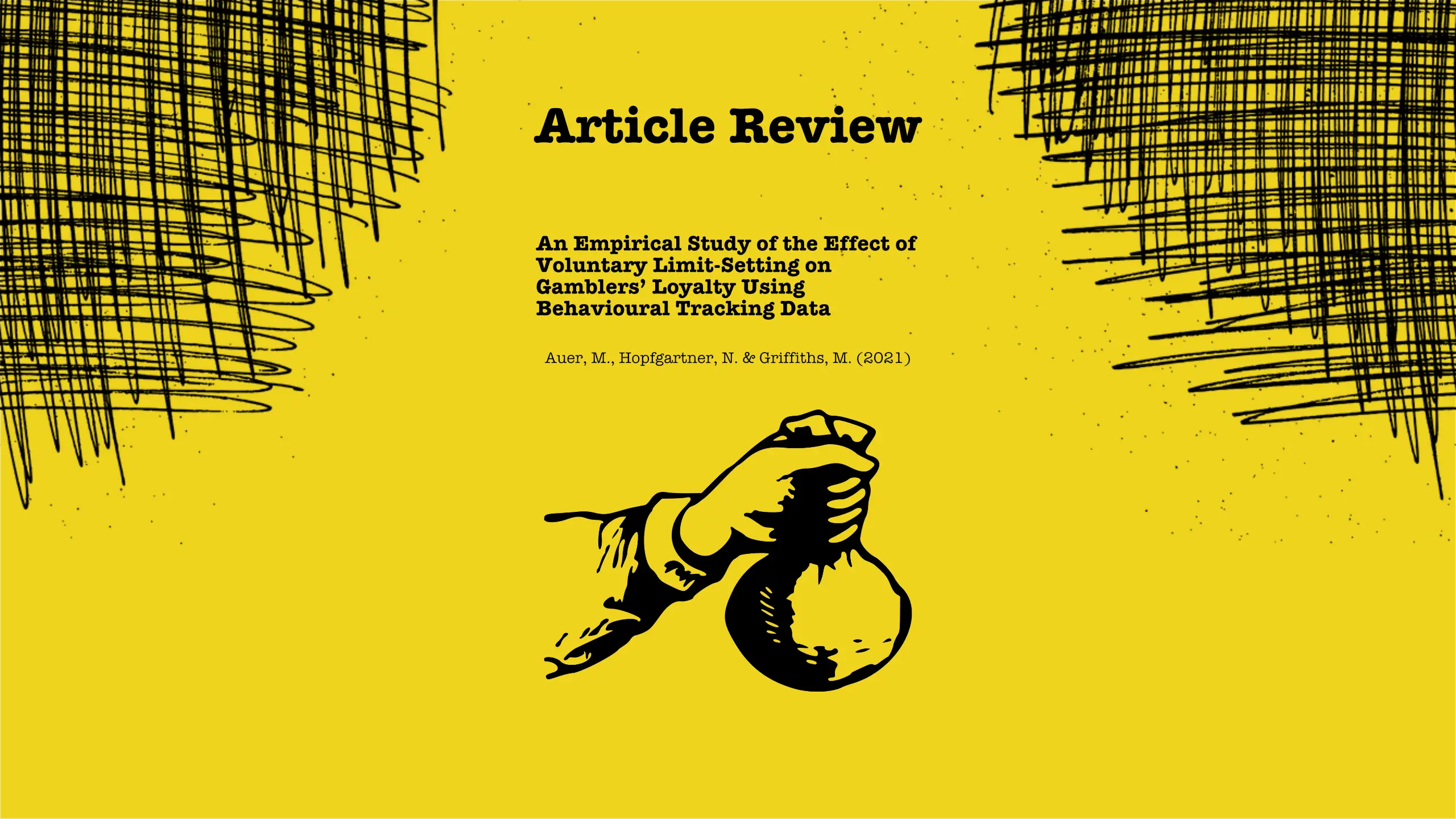Responsible gambling tools are often discussed in the context of harm prevention, but recent research indicates that they can also serve a strategic retention function for gambling providers.
In An Empirical Study of the Effect of Voluntary Limit-Setting on Gamblers’ Loyalty Using Behavioural Tracking Data (Auer, Hopfgartner & Griffiths, 2021), the authors examine how voluntarily chosen deposit limits affect player behavior, longevity, and brand loyalty.
The findings challenge traditional assumptions by revealing that players who set voluntary limits tend to remain active longer, showing both increased control and stronger emotional commitment to the gambling brand.
Key Concepts
1. Voluntary deposit limits as a retention mechanism
The study demonstrates that gamblers who voluntarily choose to set deposit limits exhibit significantly higher loyalty and engagement.
This relationship can be explained through perceived control — players who feel in charge of their own gambling behavior experience less guilt, greater satisfaction, and consequently, a longer relationship with the provider.
“From a business perspective, the implication is that gambling operators should try to get their players to utilize limit-setting features because it may increase long-term customer retention while simultaneously providing protection against over-spending.”
This finding repositions responsible gambling tools not as barriers to play, but as sustainable engagement strategies that promote responsible yet enduring participation.
2. The paradox of higher losses among responsible players
A notable phenomenon revealed in the study is that players with voluntary deposit limits often lose more money over time.
This is not necessarily a sign of increased harm — rather, it reflects greater loyalty and longer activity periods.
Players who stay active longer naturally incur more total losses, despite maintaining controlled behavior within self-imposed limits.
Thus, limit-setting serves as a balancing mechanism — fostering retention without necessarily increasing problem gambling risk.
3. Behavioral differences across player demographics
The research data indicated that:
- Only 8.3% of players in the sample used voluntary deposit limits.
- The likelihood of limit-setting decreased with age — older players were less inclined to use such tools.
- Male players who used voluntary deposit limits were more active than those who did not, suggesting a gendered pattern of engagement and retention.
- However, voluntary limits did not reactivate inactive users, meaning that limit-setting affects existing loyal players more than lapsed ones.
These findings align with behavioral tracking literature suggesting that self-regulation tools attract already-engaged, conscientious users rather than disengaged or problem players.
4. Electronic payment systems and risk dynamics
One of the structural risks of online gambling arises from instant electronic payments, which reduce the psychological friction of spending compared to physical cash transactions.
As Gainsbury et al. (2013) and Wood & Williams (2011) argue, such seamless systems may amplify impulsivity, making voluntary limit-setting an essential protective countermeasure.
By integrating pre-commitment mechanisms (e.g., daily or weekly deposit caps), gambling providers can help users manage spending impulses without external enforcement.
5. Accuracy gap between self-report and behavioral data
The study also builds on the established finding that self-reported gambling losses often differ from actual behavior.
Players tend to underestimate their losses or overestimate wins — a bias documented by Braverman et al. (2014) and Auer & Griffiths (2017).
Behavioral tracking methods eliminate this bias, allowing for a more precise understanding of user patterns, retention predictors, and intervention outcomes.
6. Brand loyalty and corporate image
A broader insight from this research links responsible gambling initiatives to brand perception.
Wu et al. (2014) suggest that corporate image and social responsibility significantly influence customer satisfaction and loyalty.
By promoting voluntary self-regulation tools, operators not only meet ethical expectations but also strengthen brand trust — effectively blending moral responsibility with marketing value.
7. Broader contextual factors
While voluntary limit-setting predicts longer customer relationships, Auer et al. caution that retention is multi-factorial.
Variables such as income level, activity on multiple gambling sites, and user experience also shape player longevity.
Thus, responsible gambling features must be seen as part of a larger behavioral ecosystem, not an isolated retention tool.
Selected Citations
- “The present study found that relatively few gamblers set voluntary limits.”
- “Players who voluntarily choose to set deposit limits tend to be more loyal to a sports gambling operator.”
- “From a business perspective … gambling operators should try to get their players to utilize limit-setting features because it may increase long-term customer retention.”
- “Older male players who set voluntary deposit limits were more active than those who did not.”
Academic Reference
Auer, M., Hopfgartner, N., & Griffiths, M. (2021). An Empirical Study of the Effect of Voluntary Limit-Setting on Gamblers’ Loyalty Using Behavioural Tracking Data. International Journal of Mental Health and Addiction, 19.
External References
- Auer, M., & Griffiths, M. D. (2017). Self-Reported Losses Versus Actual Losses in Online Gambling: An Empirical Study. Journal of Gambling Studies, 33, 795–806.
- Braverman, J., Tom, M. A., & Shaffer, H. J. (2014). Accuracy of Self-Reported Versus Actual Online-Gambling Wins and Losses. Psychological Assessment, 26, 865–877.
- Gainsbury, S., Russell, A., Hing, N., Wood, R., & Blaszczynski, A. (2013). The Impact of Internet Gambling on Gambling Problems. Psychology of Addictive Behaviors, 27, 1092–1101.
- Griffiths, M. D., Wardle, H., Orford, J., Sproston, K., & Erens, B. (2009). Sociodemographic Correlates of Internet Gambling. CyberPsychology and Behavior, 12, 199–202.
- Wardle, H., Moody, A., Griffiths, M., Orford, J., & Volberg, R. (2011). Defining the Online Gambler and Patterns of Behaviour Integration. International Gambling Studies, 11, 339–356.
- Wood, R., & Williams, R. (2011). A Comparative Profile of the Internet Gambler. New Media & Society, 13, 1123–1141.
- Wu, Y., Li, H., Gou, Q., & Gu, J. (2017). Supply Chain Models with Corporate Social Responsibility. International Journal of Production Research, 55(22), 6732–6759.
